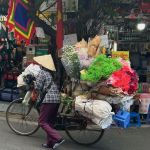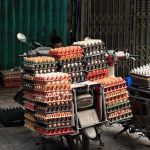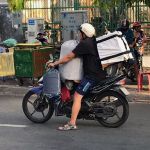New Beginnings
I often act on opportunities that “sound fun” without giving the details too much thought. As a result, I’ve had a number of new beginnings. As someone who had never camped more than one night, would I have applied to be a leader for a group of younger students for a four-week natural survival experience, if I had given it much thought? Nope! But all my friends were applying to be leaders and I did like that one night of camping. . . . Would I have moved to Philadelphia right out of college even though I didn’t know anyone there? Probably not. But I had heard Philly was a nice city. And when my new husband and I knew we weren’t ready for a house, a SUV, or a baby we went in search of another new beginning. My husband was at a teaching conference and mentioned to someone that he was interested in international teaching and he was immediately offered an interview for a brand new school in Tianjin, China. We knew almost nothing about Tianjin, but adventure seemed to be calling. Within one year of first learning about Tianjin, it became our new home.
Information about Tianjin was not plentiful in 1994. My Japan-based brother visited Tianjin for us and got some footage of the school and our apartment, so we had a general visual. We were welcomed by the new principal and a few teachers who had arrived the previous year. We were young, and everything was an adventure. We were constantly learning and trying to figure out how this new reality worked and how we fit into it. The realities were that we needed to learn some Chinese quickly, lived in a sixth-floor walk-up, had a phone but no idea what combination of numbers would get us a line, and that cold beer was not a concept. But as I’ve found with many new experiences, the people are what make the experience enjoyable and memorable.
Even our daily walk from home to school was an adventure. The route took us through a market that came alive early in the morning and stayed busy all day. The bakers were there in the morning, and the afternoon brought out the barbers, who would hang a mirror on a tree and set a chair facing the mirror. One week my four-year-old nephew visited us from Korea. As we walked through the market he said, “Aunt Amy, at my house we get our hair cut in a building.” The dentists also appeared in the afternoon, setting their tools on a folding table and placing their mirrors on a different tree or stand.
We were a novelty to the locals. Very few foreigners lived in our part of the city, and only a few of our fellow teachers walked through this market each day. In the early days, my husband would ask the local shopkeeper if they had any Bīng píjiǔ (cold beer), which they never did because the custom was to drink beer at room temperature. So we learned to buy the píjiǔ a day or two ahead so we could refrigerate it. One day we went into the shop to buy our warm beer, and the shopkeeper proudly took us to the ice cream freezer where they had placed two liters of Tsingtao beer for us. We became loyal customers. After a while, the bread sellers knew exactly how many little rounds of bread we needed for our walk to school. The bike mechanics often told us when we needed air in the tires of our bikes. Tianjin became our home for three years before we longed for another new beginning.
This time we moved to a new part of the United States—South Carolina. We were both midwesterners and had never even considered moving to the South, but we felt we needed graduate degrees and South Carolina had an excellent reputation for our fields. Some aspects of life in South Carolina felt as foreign to me as life in China had felt at first. Cultural norms that were common to the locals were new to us. No one had ever asked us where we went to church before. As a child, everyone in my small town knew what church I attended. And in Philadelphia and China, no one ever asked. But in South Carolina, it was one of the “getting to know you” questions. Our temporary relocation for graduate school became a fifteen-year experience. We soon found ourselves with a house on a cul-de-sac, two cars, two children, and two full-time jobs. South Carolina was, and still is, our family “home,” but a similar feeling of “let’s try a new reality” set in when we were in our mid-forties.
It was early 2012, we were exploring options, when a school in Cairo, Egypt, advertised openings for both of us. Over many months that option became a reality when we accepted jobs beginning in the summer of 2013. Most of our family and friends thought this adventure was foolhardy. We had two children, then ages eleven and thirteen; the Arab Spring had taken place two years before and Egypt was still struggling; Mubarak had been imprisoned and Morsi elected, but the news reports indicated that no one was very happy with his regime. And yet we were energized by the potential adventure. What we didn’t plan on was Egypt experiencing a second revolution a month after our arrival.
Our plane landed in Cairo as the sun was setting and Iftar was beginning. Workers were moving about the airport with their boxed meals looking for a place to sit and break their fast. My daughter flew from South Carolina to Cairo in her short shorts, which were the teen fashion of the day, but she was instantly uncomfortable and wondered why everyone was staring at her. As we were leaving the airport, a fight broke out between a couple of men, which grew to a few men and eventually many men. Although we had no idea what words were being spoken, we understood the tone. The children turned to us and asked, “What’s happening? What is this all about?” At that moment I realized we had fulfilled our wish for “new,” but maybe this “new” was more than we had bargained for.
The country was still on high alert. We navigated the airport and the parking garage and began the drive to our neighborhood, which required passing through hastily constructed gates of barbed wire bundles and tanks with guards monitoring the traffic. Our neighborhood had several embassy residences in it, and all of the house guards seemed to have semiautomatic weapons as part of their uniform. These new sights, which I had always associated with war and danger, were just part of the daily scenery. A 6 pm to 6 am curfew was instituted within our first two weeks, and although we hardly knew where to get all the items we needed for daily life, now we had to figure it out between the end of the workday and 6 pm. Looking back, those details become part of the infrastructure of our memory—but the people are what we truly remember.
There was the man in white boots washing cars who I greeted every day as I rode by on my pink bike. Some days I said hello in Arabic and some days in English. Some days he greeted me in Arabic and some days in English. The language didn’t matter—what mattered was that we were warmly acknowledging each other as we went about our daily tasks. Then there was Sherif who would deliver groceries we ordered, by text or phone, from the market. He would show up with things he knew we liked whether they were on the original shopping list or not. A common statement from Sherif was, “I know you didn’t order grapes, but they just came in and I know your children like them.” We always accepted whatever Sherif felt our kitchen needed. When I ordered hamburger buns, he always brought hamburger and hotdog buns just in case there’d been some confusion of language, then what I didn’t want, he’d return to the store. My favorite memory of Sherif is when I was having a glass of wine at a friend’s house and he dropped off her groceries. Seeing me there, Sherif reported everything my husband had ordered to be delivered to our house—just in case I needed to make any additions.
The year 2017 was another new beginning for our daughter as she headed off to university, and the desire for a new beginning struck the rest of us again. In December 2017 we secured jobs in Vietnam for the summer of 2018. Part of the job application process as an international teacher is to submit fingerprints from the countries in which you have recently lived. We went to the police station in Cairo, had our fingerprints taken, and were told to return in two weeks to pick them up. The two-week mark was December 25, which is a normal day in Cairo as Coptic Christmas is celebrated a week later on the Orthodox calendar. We were awake at 6 am, like every day, and we knew that our teens wouldn’t be up for a couple hours so we decided to walk over to the police station to pick up our fingerprint report. As we walked home we stopped at one of our usual vegetable and fruit shops to buy what we needed. As we were checking out, Ali handed us a tray of beautiful strawberries and said, “I know it is an important holiday in your culture, please accept this gift.” This is the kindness of Cairo, which I had never seen in any news reports in the previous fifteen years.
By June we had filled out oodles of paperwork, sold what we didn’t need or want, shipped what we did, and hopped on a plane. We had visited Vietnam twenty years before but knew much had changed. This new beginning was an easier transition for us due to experience, country stability, and with now only one child at home.
One thing I’ve discovered in all these moves is that there are three things I need to help me feel settled, but they all require a bit of time and trial and error to get just right. As a woman with short hair, I only have about seven weeks after landing before I want a haircut. Long hair seems to be the default for women in both Cairo and Vietnam so finding a skilled hairdresser required me to ask strangers with short hair where they got their hair cut. This system works, but it usually took six to nine months to find my “person.” Finding a doctor is a similar experience, and since medicine is deeply influenced by culture I need to find a practice that shares my sense of medical “normal” and then try their doctors. Sometimes this is easy and everyone seems to go to the same clinic, and other times, you try a few before you find a doctor you connect with. Friends take time as well. In the first few weeks, it’s helpful to accept every invitation and offer a few yourself in order to find people with whom you have common interests. Experience has taught me that by the six-month mark, I have at least a couple of people I enjoy meeting for coffee or lunch.
Daily life in Vietnam did not require as much adjustment as in China or Egypt. Our neighborhood operated much like living downtown in a US city would. We walked to work, stores, pharmacies—pretty much everything we needed for daily life is within a kilometer, including a mall with a Gap, Muji, and H&M. As a result, Operation Hairdresser, Doctor, and Friends was able to start right away! All three requirements fell into place, which proved fortuitous because eighteen months after we arrived, COVID arrived in Vietnam.
Our school closed on February 1, 2020, but all businesses and services ran as normal. By late March 2020, the borders were closed. Planes out regularly, but the only flights coming in were repatriating Vietnamese citizens. No one was being issued a visa to visit. We had a daughter in university we couldn’t see and a son who was living with us but wasn’t sure he could leave to get to university, but our frustrations were minor compared to what much of the world was experiencing. By August 2020, schools were back in session, COVID cases were almost nonexistent, and life was moving along, masked, but normally. We traveled freely throughout the country and had all kinds of adventures that wouldn’t have been possible if the borders were open and tourism was operating as usual.
But all that changed in May 2021 when COVID cases began to rise quickly, and the thirty-five reported deaths that year started climbing into the hundreds and thousands. Schools went online for a month and then the summer began. After our first vaccine, we decided to go on a beach holiday and booked a driver for the eight-hour trip up the coast. Days after we left Saigon, most provinces in Vietnam closed their borders and all domestic flights were canceled. Cars were not allowed to leave provinces or cities except under specific conditions, and our one-week vacation turned into a three-week holiday. We stayed at the hotel and became friends with others who weren’t quite sure how to get back to Saigon or Hanoi, but eventually needed to return to work and, in Vietnam, where there’s a will there’s a way. We met the general manager of the hotel and asked if there was any way to get to Ho Chi Minh, and he said, “Of course, when do you want to go?” We asked how he could be sure that we’d get through when all the news reports said the city entrances were essentially closed. And his response was, “Don’t worry, our guys will get you home.” And they did.
Early August saw a 6 pm to 6 am curfew, and by late August, the city instituted a “remain at home” order, which lasted six weeks. It took numerous days for the cities to figure out how people would get groceries if no one was allowed out. When I spoke with a friend in the United States, she said she felt like I was living in a young adult novel about World War II where each week some aspect of daily life was no longer allowed. During the twenty months of active COVID, different levels of lockdown ensued and through all of them, the people made each stage memorable. Vietnamese people are incredibly resourceful and adaptable, and the pandemic provided an opportunity to adapt. The local flower shop started delivering fruits and vegetables, the brewery delivered beer and essential groceries, and our favorite Mexican restaurant delivered a margarita in a plastic bag with ice in a separate bag. Almost anything can be delivered on the back of a motorcycle—groceries, ice, a new refrigerator, sheets of glass, or plastic bags with live goldfish.
After our final hard lockdown was over, the first people I contacted were friends I wanted to see “in 3D” and then the hairdresser and doctor. Second, I biked to the salon as soon as I could. The skin doctor was third as I had missed my annual skin check, which I am religious about. Compared to many, our experience of the pandemic was manageable, but adjusting to a strong federal government during an international crisis was a new experience.
We expect we’ll have a couple more new beginnings, and probably one more job relocation before we settle for good. Although our instinct is to return to South Carolina, our adult children’s chosen locations may influence that decision. The dichotomy of wanting to have adventures living abroad and wanting to be settled in a community of family and friends is always present, and we’re hoping life is long enough for both.











I loved reading this account of your experiences. I knew the rough timeline, but not all the beautiful details.
Amy,
Thanks for posting the connection to your article on Facebook.
I enjoyed reading your adventures of “new beginnings.”
When you mentioned your “small town” of your upbringing, the visions in my brain went directly to W. Dundee and your house on the corner of 1st and Liberty.
I am happy that you and your family have had the opportunities to travel in and live in so many places.
So cool to read Amy! Thank you so much for taking the time to put these fascinating experiences on paper. Good luck with the next “new beginning!”
Amy — I read it all with great relish. You and David and “the kids’ (who are no longer kids) — are — without question — our very favorite Citizens of the World.
Love and Peace to you all, and congrats to you for getting this published!
Wow, Amy! What a wonderful memoir of your travels and adventures around the globe! Brava, dear girl. Perhaps you should extend this into a full-fledged memoir. It’s definitely publishable!
Amy, I agree with Patricia Ricketts. You should extend this into a full-fledged memoir. Thank you for sharing and thank you for continuing to get in touch when you are in Indy. I loved learning more about your amazing life. Thank you.